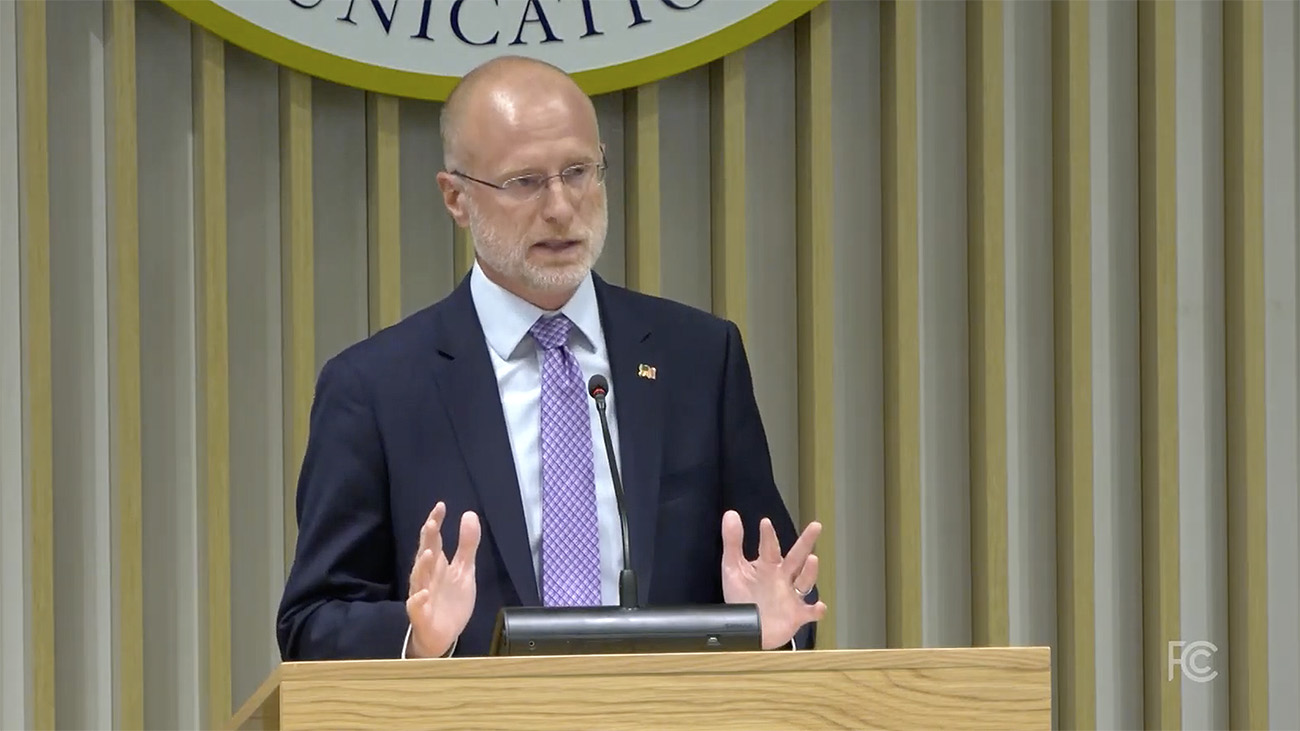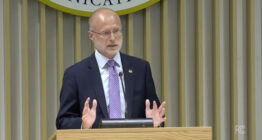FCC chairman defends broadcast license review amid presidential criticism of networks

Weekly insights on the technology, production and business decisions shaping media and broadcast. Free to access. Independent coverage. Unsubscribe anytime.
The Federal Communications Commission will hold broadcast television stations accountable to their public interest obligations, Chairman Brendan Carr said Nov. 20, responding to questions about Donald Trump’s recent call for ABC to lose its broadcast license.
“Broadcast television stations are simply different than any other means of distribution,” Carr said during a press conference following the commission’s monthly meeting. “They have a license and they have a public interest obligation. And we’re going to hold them accountable to that.”
Carr’s comments came after Trump criticized ABC over a reporter’s question during an Oval Office exchange earlier this week. The president has repeatedly called for networks to lose broadcast licenses over coverage he considers unfavorable.
“If there’s nothing that you can do as a broadcaster to lose your license, then it’s not a license. It’s a property right,” Carr said. “But I think we have to get back to enforcing that public interest standard.”
Commissioner Anna Gomez noted that national networks like ABC, CBS and NBC do not hold FCC licenses. Individual television stations hold the licenses, and none of those licenses are currently up for renewal.
“National networks that the administration is targeting are not licensed by the FCC, but the local broadcasters are,” Gomez said during her own press conference. “And if the FCC were to take the unprecedented step to revoke a license on the grounds that reporting by a network is unfavorable to this administration, it would run headlong into the First Amendment and fail in court.”
Gomez described recent actions as part of “a growing and pervasive campaign to censor speech and to control the media.”
She said the threats against media organizations, while unprecedented, carry limited actual authority.
“While the FCC is a powerful regulatory agency, that power does not exist without limits,” Gomez said. “And the strongest guardrail we have against these censorship threats is the First Amendment.”
The commission’s Media Bureau this week opened a proceeding seeking public input on the relationship between local broadcasters and national networks. The notice examines whether national programmers exercise too much control over local stations, potentially preventing them from meeting their public interest obligations.
“There’s long been a federal rule that gives local broadcasters the right to preempt national programming that they don’t think meets the needs of their local communities,” Carr said. “But local broadcasters have, from my understanding, from what they’ve told me over the years, been hesitant to exercise that right.”
Carr said the commission has not examined the relationship between national programmers and local affiliates in more than 15 years. The proceeding could potentially lead to rules giving local stations more power to preempt network programming.
“To the extent that they become merely a pass-through appendage of a national program, that’s not the system that the Congress or the FCC put in place,” Carr said.
Gomez said any enforcement of the public interest standard must include clear definitions of what that standard means. She outlined three traditional components: promoting competition, serving local communities through localism, and ensuring diversity of viewpoints.
“The public interest standard does not mean that this administration, this FCC, gets to regulate content that we don’t like,” Gomez said. “The Communications Act actually prohibits the FCC from censorship. And, of course, the First Amendment protects against that censorship as well.”
When asked about previous FCC actions on content issues, Carr cited a notice of proposed rulemaking from 2024 that addressed artificial intelligence disclosures in broadcast television. That proceeding referenced 1960s-era FCC case law regarding misleading or deceptive programming.
“Some of this may be reaching back a little bit, but I think it’s important to reinvigorate,” Carr said. “But some of it is simply building on the precedent of the most recent prior FCC.”
Gomez drew a distinction between that proceeding and current actions. “The AI, the notice of proposed rulemaking on disclosures when AI is used in political advertising is very different than delving into editorial decision by news organizations,” she said.
The commission is also reviewing broadcast ownership rules, including the 39 percent national audience reach cap. Some stakeholders have filed waiver requests seeking to exceed that limit.
Carr said the review examines whether current rules create an imbalance of power between national programmers and local television stations.
He said one potential benefit of modifying the cap could be to “help balance some of the power between local TV stations, again, which aren’t necessarily owned by the national programmers and the national programmers themselves.”
Gomez said she does not believe the commission has the authority to waive the statutory 39 percent cap. “The cap is in the statute. It does not give us the authority to waive,” she said. “We don’t waive statutes.”
The commission has an open investigation into ABC regarding the network’s handling of the 2024 presidential debate. Carr said there was no news to announce regarding any expansion of that probe or new proceedings against other networks.





tags
Anna Gomez, Brendan Carr, FCC
categories
Broadcast Business News, Broadcast Industry News, Heroes, Networks, Policy